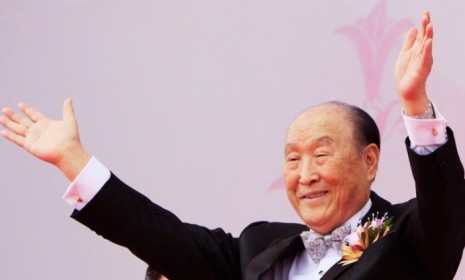The grandiose legacy of the Rev. Sun Myung Moon
The founding "messiah" of a religion mostly known for massive group weddings is dead. What happens to his multimillion-dollar business empire now?

The spectacle of massive group weddings and young "Moonies" selling roses and candles on street corners were largely fading memories when the messianic founder of the Unification Church, Rev. Sun Myung Moon, died in South Korea on Sunday at age 92. But Moon's spiritual and business empire is very much alive — for now — spanning several continents and numerous industries, including gunmaking, newspapers, hotels, and America's sushi-grade fish trade (which he largely controlled). Here's a guide to the life and legacy of a man who was both worshipped as a god and derided as a cult-leading charlatan:
Briefly, who was Moon?
Born Moon Yong Myung in January, 1920, the future religious leader grew up in a farming family in what is now North Korea. His family abandoned Confucianism for Christianity when Moon was about 10, and he was a practicing Presbyterian on Easter Sunday in 1935 when, according to Moon, Jesus appeared and asked him personally to "complete the task of establishing God's kingdom on Earth and bringing peace to humankind." After a decade of praying, studying religion (and electrical engineering in Japan), and developing his own theology, Moon built his first church in 1950, and founded the Holy Spirit Association for the Unification of World Christianity, or Unification Church, in 1954. He first proclaimed himself the messiah in 1992, and, twelve years later, took some members of Congress aback by announcing that emperors and presidents had "declared to all heaven and earth that Rev. Sun Myung Moon is none other than humanity's savior, messiah, returning lord, and true parent."
The Week
Escape your echo chamber. Get the facts behind the news, plus analysis from multiple perspectives.

Sign up for The Week's Free Newsletters
From our morning news briefing to a weekly Good News Newsletter, get the best of The Week delivered directly to your inbox.
From our morning news briefing to a weekly Good News Newsletter, get the best of The Week delivered directly to your inbox.
What does his church believe?
Moon's theology, compiled in a dense book called The Divine Principle, is a combination of biblical Christianity, Eastern philosophies, and his purported divine revelations. It all starts with the belief that Jesus' work was incomplete: He saved the world spiritually but not physically, because he was crucified before he could marry and have children, thus fulfilling mankind's destiny to be sinless "perfect children" of God. Since Jesus failed to create a perfect family, that task fell to the "true parents of all humanity," a title Moon claimed for himself and his second wife, Hak Ja Han. The couple sought to bring about purification via marriage — thus the large group weddings where Moon himself is said to have matched up complete strangers based on questionnaires, photos, and consultations with church officials.
How big were these mass weddings?
In his most publicized event, held in Madison Square Garden in 1982, Moon blessed the union of 2,075 couples, the grooms all dressed in identical blue suits and the brides wearing white lace-and-satin gowns. (In May, Unification Church officials estimated that about 70 percent of those couples are still together 30 years later, a marital success rate that well exceeds the national average.) But the Madison Square Garden event was not his record: Moon joined 21,000 couples in Seoul's Olympic Stadium in 1999, and as late as 2009 he presided over a ceremony at Korea's Sun Moon University in which 10,000 couples were wed or renewed their vows, with hundreds more joining in via the internet.
A free daily email with the biggest news stories of the day – and the best features from TheWeek.com
When did Moon come to the U.S.?
His first representative arrived in 1959 to bring the Unification Church to America, and Moon himself first visited the U.S. during a 1965 world tour of 40 countries, before officially moving to America in 1971. He toured the U.S. extensively in 1972, and famously organized large rallies to support President Richard Nixon during Watergate. Moon spent most of his long sojourn in the U.S. in New York, where he or his organization owned two estates and a seminary in the Hudson River Valley just north of New York City, plus extensive properties in the city itself, including the New Yorker Hotel and nearby Manhattan Center in midtown Manhattan.
What else did he own?
The Moon empire includes newspapers in South Korea, Japan, South America, and the U.S. — most notably The Washington Times, which he founded in 1982 as a conservative alternative to The Washington Post, and the remnants of United Press International (UPI), which an affiliate bought a decade ago — plus a ballet school in Washington, U.S. gun maker Kahr Arms, Washington-based independent broadcasting giant Atlantic Video, a controlling stake in Connecticut's University of Bridgeport, and seafood interests including Chicago-based True World Foods, which reportedly supplies 75 percent of the raw fish for the 9,000 sushi restaurants in the U.S. Moon's South Korean conglomerate, Tongil Group, owns a pharmaceutical company, a soccer team, an automaker, a marble and granite supplier, a luxury resort, and a travel agency. While it's estimated that Moon's empire is worth billions upon billions of dollars, no one knows its precise value.
What happens to his empire now?
By most accounts, Moon's 10 surviving children are locked in various feuds and power struggles, but one son, Rev. Hyung-jin Moon, 33, has been groomed to take over the religious duties and another son, Kook-jin "Justin" Moon, 42, runs Tongil Group. Outside Moonie watchers expect the business part of the Moon dynasty to thrive, but Moon's Unification Church is an iffier prospect. "I don't think there will be any individual who will take his place," said longtime observer Frederick Sontag, a former professor of religion at Pomona College in California, in 2007. "He is too powerful a figure."
So how will Moon be remembered?
"I am not qualified to judge whether Rev. Moon was a good person and/or sincere in his religious beliefs," says Anne Laurie at Balloon Juice, but his influence on American religion and politics was "an unmixed evil." Starting with his support for Nixon, he paved the way for a generation of creepy "spiritual" powerbrokers adept at "mixing religious showmanship and old-fashioned political graft at the highest levels." Moon was "clearly a charlatan," says Doug Mataconis at Outside the Beltway, who specialized in disturbing brainwashing techniques and spent a year in federal prison for tax evasion. I doubt his cult-of-personality religion will survive long, but his legacy as a businessman seems on solid footing.
Sources: AP (2), Balloon Juice, Bloomberg Businessweek, New York Times (2), Outside the Beltway, Religion News Service, TIME
-
 Wilde Cambridge: home-away-from-home in a prime city spot
Wilde Cambridge: home-away-from-home in a prime city spotThe Week Recommends This laid-back aparthotel is the perfect base for a weekend of exploring
-
 The best alcohol-free alternatives for Dry January
The best alcohol-free alternatives for Dry JanuaryThe Week Recommends Whether emerging from a boozy Christmas, or seeking a change in 2026, here are some of the best non-alcoholic beers, wines and spirits to enjoy
-
 A lemon-shaped exoplanet is squeezing what we know about planet formation
A lemon-shaped exoplanet is squeezing what we know about planet formationUnder the radar It may be made from a former star